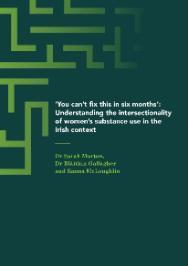Exploring the intersectionality of women’s problematic substance use within the Irish context (INTER-WOMSU)
Principal Investigator: Dr Sarah Morton, Asst. Prof. in Social Policy. Partner organisation: Merchant's Quay Ireland.
Funding organisation: IRC New Foundations.
Background
Problematic substance use continues to be a major concern within social and health policy in Ireland, particularly within the context of the Covid19 pandemic, with concerns in regard to increasing prevalence rates, absence of harm reduction and substance use stabilisation services and significant increases in treatment waiting lists. Internationally the WHO UNODC treatment guidelines (2020) provide a much needed overarching framework for interventions given that historically, Irish drug policy and intervention has taken a broadly gender-neutral approach, with a welcome and notable shift to consider the needs of women in the current strategy. Three of the 50 action points within the strategy relate directly to or specifically name women. However, there is broad consensus by stakeholders that a gender sensitive, if not gender transformative approach is warranted, within both policy and intervention. Ireland has a history of drug treatment and intervention that originated from an abstinence-based approach, with limited or no focus on the role of gender within substance use initiation, trajectory or intervention.
Over the past 15 years there have been changes to; include women in substance use treatment and intervention; develop some gender specific services and interventions for women; and develop resources and responses within relevant ancillary services such as homeless shelters and domestic violence series to attend to the needs of women who are using substances problematically. However, the impact of this work has been limited and there remains a dearth of literature and consideration of the needs of women using substances, and the needs of those experiencing an intersectionality of issues such as trauma, domestic violence, poverty, homeless and substance use. Service providers have identified multiple challenges to responding to and supporting women where there are complex experiences, and often, complex needs including problematic substance use. In addition, devising responses to address issues in regard to motherhood or pregnancy can be particularly challenging. While there have been a number of important initiatives seeking to respond to women’s needs, as well as reviews of critical women’s lived experiences remain relatively unheard, a reflection of the emerging nature of the understanding of intersectionality, as well as the challenges in accessing seldom hear voices. This proposed study derives from an action learning project completed in 2020 by the UCD Community Drugs Programme in partnership with Merchants Quay Ireland that sought to build a network of agencies within the South Inner City Dublin who were responding to women's complex needs.
Research Design
Given the importance of capturing women’s, including transgender women’s, lived experience of substance use and related complex issues, this research will take a primarily qualitative approach, with in-depth interviews with up to 20 women who have or are experiencing substance use issues, together with other needs and currently in contact with relevant services including MQI and other relevant organisations.
Research aims
To explore the experiences and needs of women who are dealing with multiple issues including problem substance use, with a view to gaining an in-depth understanding of women’s life experiences, substance use trajectories and how these relate to factors such as motherhood, poverty, social exclusion, residency status, trauma, domestic violence, transactional sex, homelessness and incarceration.
Research objectives
Explore the lived experiences of women with substance use and intersectional aspects including their engagement with services. Define the unique gendered support needs and service pathways for women. Inform future Irish drug policy and service pathways.
Expected Outputs and Outcomes
The potential impacts and benefits of the proposal. The outputs are clearly identified as the planned activities based on the allocation of resources. Outcomes are the anticipated short-term results of the research project and its outputs. The outputs would include: A digitally produced research report A published commentary paper and empirical journal article A dissemination event (digital or live depending on public health advice) with the aim of presenting and discussing the policy and intervention implications of the findings A digital practice and policy briefing guide for decision makers and organisations responding to, or seeking to respond to women with complex issues including substance use. The work supports global WHO and UNODC advocacy efforts and generation of technical guidance to leverage for a rights based approach to supporting women who use drugs, in terms of targeted drug prevention, treatment and rehabilitation. It further responds to the Sustainable Development Agenda regarding gender equality.
Outputs:

See the following link to download the full pdf report: (opens in a new window)chrome-extension://efaidnbmnnnibpcajpcglclefindmkaj/https://www.drugsandalcohol.ie/38492/1/You%20cant%20fix%20this%20in%20six%20months.pdf
To cite this report: Morton, S., Gallagher, B. & McLoughlin, E (2023) ‘You can’t fix this in six months’: Exploring the intersectionality of women’s substance use in the Irish context. University College Dublin/ Merchants Quay Ireland: Dublin, Ireland.
For further information please contact Dr Sarah Morton. Email: (opens in a new window)Sarah.Morton@ucd.ie
